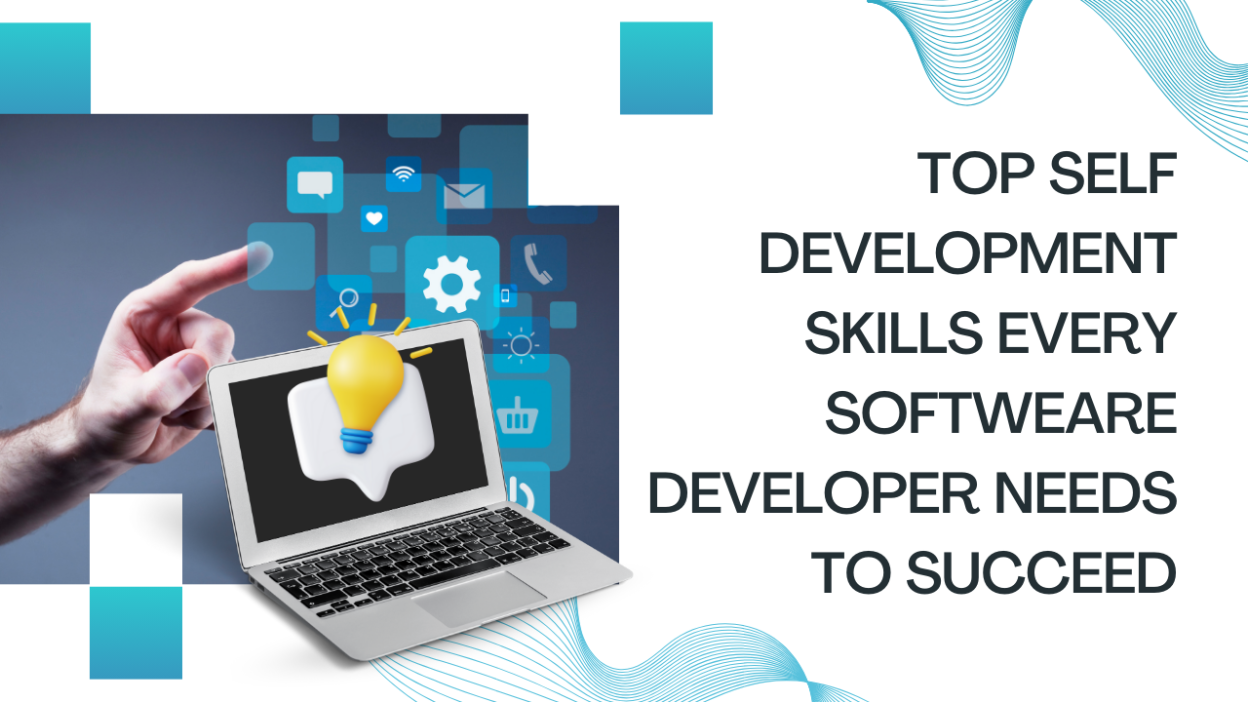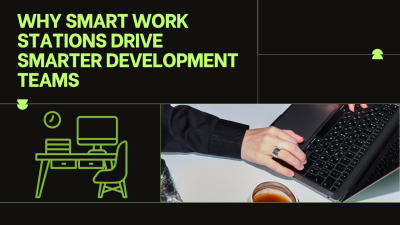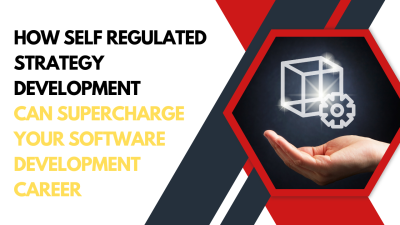Over the years of coding, developing softwares at Qtec Solution Limited, and tackling ever-evolving challenges in the tech industry, I’ve come to realize one powerful truth—the most important tool in your career as a software developer isn’t your coding skills. It’s your Self Development Skills.
Once I realized that sharpening my Self Development Skills was the key to unlocking the next level of my career, everything changed. I’m not just a better developer now; I’m a more focused, motivated, and adaptable person. These Self Development Skills are what I continue to lean on every day, and I believe they’ll do the same for you.
So, let me share the Self Development Skills that have made the biggest difference in my journey. If you apply these, you’ll notice a shift in how you work, how you grow, and how you succeed.
Table of Contents
1. Time Management – Making Every Second Count
As a software developer, the pressure to meet deadlines is constant. What I’ve learned over time is that Self Development Skills in time management are essential to maintaining control over your workload. Early on in my career, I used to rush through tasks, constantly feeling behind. But that approach only led to burnout and subpar results.
Now, I prioritize tasks that move the needle forward. I break my day into manageable chunks and set clear goals to keep myself accountable. Here’s how it works for me:
- Set a realistic schedule: I’ve learned not to overcommit. Setting daily, weekly, and monthly goals that are achievable is key to making real progress.
- Break projects into smaller tasks: Tackling a huge project can feel overwhelming. I break it down into smaller tasks and focus on one at a time.
- Avoid distractions: By limiting distractions during work hours (like social media or random browsing), I keep my energy focused and productive.
The best part? Mastering time management through Self Development Skills has not only made me more efficient but has also given me more time to enjoy life outside of coding.
2. Growth Mindset – Embrace Challenges
When I first started out in software development, I thought I had to be perfect. I’d feel ashamed if I couldn’t solve a problem quickly or if a project didn’t go as planned. But over time, I realized that Self Development Skills centered around having a growth mindset were a game changer.
I began to embrace challenges as opportunities to learn. I no longer saw mistakes as failures, but as stepping stones toward mastery. Here’s how cultivating a growth mindset has shaped my career:
- Learn from mistakes: Instead of fearing failure, I now see it as a chance to grow. Each error teaches me something valuable that improves my future work.
- Seek continuous learning: No matter how much I know, I always make space to learn more. I take courses, read articles, and engage with other developers to stay on top of the latest trends.
- Challenge myself: I push myself to take on projects that stretch my abilities. Whether it’s learning a new framework or working on a more complex application, the growth mindset fuels my progress.
By constantly embracing challenges and adopting a growth mindset, I’ve not only become a better software developer but also a more resilient person in the face of difficulties.
3. Communication – Code Isn’t Just for Machines
One thing I’ve learned throughout my career is that being a great developer doesn’t just mean writing flawless code. It’s about how you communicate with your team, your clients, and even your future self. Strong communication is one of the most underrated Self Development Skills a software developer can possess.
Early on, I struggled with communicating technical concepts to non-technical clients. I would often get frustrated when they didn’t understand the complexities of my work. But as I improved my communication skills, I noticed a dramatic improvement in my collaborations. Here’s how I’ve worked on this skill:
- Explain your reasoning: I make an effort to explain my decisions to team members and clients, not just the “how” but the “why” behind my choices.
- Listen actively: Being a good communicator also means listening. I’ve learned to listen to feedback, questions, and concerns, which ultimately leads to better solutions.
- Write clear documentation: Writing good documentation is part of effective communication. Whether it’s API documentation or project notes, I ensure my code can be understood by anyone who needs to work with it.
The impact of improving communication through Self Development Skills has been profound. It’s made me more collaborative, helped me build stronger relationships, and even allowed me to become a leader in my team.
4. Emotional Intelligence – Stay Calm Under Pressure
In the fast-paced world of software development, staying calm under pressure is a crucial skill. Early in my career, I would get flustered when deadlines loomed or when a bug wouldn’t be fixed. But as I developed my Self Development Skills in emotional intelligence, I began to handle stress and challenges much better.
Now, I focus on understanding my emotions and how they affect my work. Here’s how emotional intelligence has shaped my career:
- Self-awareness: I’ve learned to recognize when I’m getting frustrated or overwhelmed and take a step back to refocus.
- Empathy: Understanding the perspectives of teammates or clients has helped me communicate more effectively and find solutions that work for everyone.
- Managing stress: I practice mindfulness and take breaks when needed, which helps me stay grounded and productive, even during high-pressure situations.
By improving my emotional intelligence, I’ve become more resilient and effective, both in my coding and in working with others.
5. Problem-Solving – Think Outside the Code
As a software developer, problem-solving is at the core of everything we do. But problem-solving isn’t just about writing code, it’s about finding the most efficient, scalable, and creative solutions to complex challenges. Over time, I realized that developing my Self Development Skills in problem-solving made a big impact.
Instead of jumping straight into writing code, I now take a step back and think through the problem thoroughly. Here’s how I approach problem-solving:
- Break down the problem: I decompose complex issues into smaller, more manageable parts. This allows me to focus on one thing at a time and tackle the problem systematically.
- Think creatively: I try to think outside the box and explore different approaches. Sometimes the best solution is the most unexpected one.
- Use the right tools: Rather than reinventing the wheel, I look for existing solutions or libraries that can solve my problem more efficiently.
By polishing my problem-solving abilities through Self Development Skills, I’ve been able to tackle some of the most challenging and rewarding projects of my career.
6. Adaptability – Thrive in an Ever-Changing Tech World
The tech landscape is always evolving. Whether it’s a new framework, a shift in programming paradigms, or emerging tools, change is constant. At first, I found it overwhelming, but over time I learned that Self Development Skills in adaptability were crucial to thriving in this fast-paced environment.
Instead of resisting change, I embraced it. Now, I view new technologies as opportunities to expand my toolkit and stay competitive in the field. Here’s how adaptability has played a role in my success:
- Stay curious: I actively seek out new tools, languages, and frameworks that can improve my work.
- Be flexible: When things change, I adjust my approach instead of stressing out. I learn to pivot without losing momentum.
- Embrace feedback: Whether it’s from colleagues or users, feedback helps me adapt my processes and improve my skills.
By developing adaptability, I’ve been able to stay ahead of the curve and feel confident facing new challenges in my career.
7. Networking – Building Relationships that Matter
In my early years, I thought coding was a solitary pursuit. But over time, I realized that building relationships with other developers, mentors, and industry professionals is one of the most valuable Self Development Skills a software developer can have. Networking isn’t just about collecting business cards; it’s about building authentic, long-lasting relationships.
Here’s how networking has benefited my career:
- Learn from others: Engaging with other developers has exposed me to new ideas and perspectives, making me a better problem solver.
- Opportunities arise: Networking has opened doors for job opportunities, collaborations, and partnerships that I never expected.
- Get feedback: My network has been a great source of constructive criticism, helping me refine my code and grow professionally.
Having a strong network of like-minded professionals has accelerated my career in ways that coding skills alone never could.
8. Delegation – Know When to Share the Load
As software developers, we often think we need to do everything ourselves. Early in my career, I took on too many tasks, thinking it was the only way to show my value. But over time, I learned the importance of delegation as a critical Self Development Skill. I realized that asking for help and sharing the workload can make me more productive and ensure the quality of the work stays high.
Here’s how delegation has helped me:
- Focus on high-impact tasks: By delegating routine tasks to others or automating them, I can focus on the more complex, high-value problems.
- Leverage expertise: I delegate tasks to team members who have more expertise in specific areas, which results in better solutions.
- Boost collaboration: Delegating fosters a sense of teamwork and encourages collaboration, which leads to better project outcomes.
Mastering delegation has been essential in preventing burnout and increasing the quality of my work.
9. Resilience – Bouncing Back from Setbacks
Setbacks are inevitable in any career, but in software development, they seem to hit harder. Bugs, failed deployments, and missed deadlines can make even the most confident developer feel defeated. However, I learned that one of the most important Self Development Skills is resilience. It’s not about avoiding failure but bouncing back stronger from it.
Here’s how I practice resilience:
- Accept mistakes: Instead of beating myself up, I view each failure as a learning opportunity that brings me closer to success.
- Stay positive: I focus on the progress I’ve made, not just the setbacks. It helps keep my energy up when challenges arise.
- Keep going: Even when things seem difficult, I take it one step at a time and trust that I can find a solution eventually.
Resilience has allowed me to persevere through difficult times and emerge more skilled and motivated than ever.
10. Self-Discipline – Maintaining Focus and Consistency
In the world of software development, distractions are everywhere—whether it’s social media, endless meetings, or just a lack of structure. Early in my career, I struggled to stay focused and consistent. But once I developed strong Self Development Skills in self-discipline, everything changed. Now, I approach each day with intention and focus.
Here’s how self-discipline has shaped my work:
- Set clear goals: I break down my long-term goals into smaller, actionable tasks that I can achieve daily.
- Create a structured environment: I minimize distractions by setting specific working hours and creating a focused workspace.
- Stick to routines: Having a consistent routine has made me more efficient and helped me maintain a steady flow of work.
By practicing self-discipline, I’ve been able to consistently produce high-quality work without getting overwhelmed or distracted.
11. Critical Thinking – Evaluate, Analyze, and Solve
As a software developer, it’s easy to get caught up in solving problems with the first solution that comes to mind. But I’ve learned that one of the most important Self Development Skills is critical thinking—it’s about evaluating multiple perspectives and analyzing the problem before jumping into a solution. Developing this Self Development Skill has made me a much more effective problem solver.
Here’s how critical thinking has shaped my approach:
- Question assumptions: I’ve learned to challenge assumptions and look at problems from different angles before committing to a solution. This Self Development Skill helps me avoid shortcuts and find the most robust solutions.
- Weigh alternatives: Instead of rushing into code, I evaluate several approaches, considering the pros and cons of each. This decision-making process is a key Self Development Skill I rely on every day.
- Think long-term: Critical thinking helps me consider not just the immediate fix, but the long-term impact on scalability and maintainability. It’s this ability to think critically that sets the foundation of Self Development Skills that help me grow in my career.
By upgrading my critical thinking, I can solve problems more efficiently and create better, more sustainable solutions—an invaluable Self Development Skill for every software developer.
12. Technical Documentation – Write for the Future
When I first started writing code, I thought documentation was a chore, something that could be skipped or done in a rush. But over time, I’ve realized that clear, concise technical documentation is one of the most powerful Self Development Skills a developer can have. It’s not just about making your code understandable to others, but also about ensuring that your future self won’t be lost in a sea of unmarked code. Embracing documentation as a core Self Development Skill has made a huge difference in my workflow.
Here’s how I approach technical documentation now:
- Document as you go: Instead of waiting until the end, I write documentation as I work on the code to keep everything fresh and relevant. This habit is an essential Self Development Skill I’ve developed.
- Be concise but clear: I focus on clarity over length, explaining what each function or class does and why certain decisions were made. This is another Self Development Skill I’ve refined to communicate my ideas better.
- Future-proof your code: Good documentation ensures that future developers can pick up where I left off without wasting time trying to understand my work. This habit has become one of the most valuable Self Development Skills in my coding journey.
Writing good documentation has saved me countless hours when revisiting old code and has made collaboration with others much smoother, showcasing the impact of Self Development Skills on my career.
13. Patience – Taking the Time to Get It Right
Software development can often feel like a race, especially when deadlines are looming, and stakeholders are waiting for results. But I’ve learned that Self Development Skills in patience are vital to long-term success. Rushing through problems or cutting corners can lead to bugs, rework, and ultimately, missed deadlines. I’ve learned to slow down and take the time to get it right. Patience is one of the Self Development Skills I lean on in the toughest of situations.
Here’s how patience has helped me grow as a developer:
- Don’t rush code: I focus on writing clean, thoughtful code, even if it takes a little longer. The result is often a more reliable, bug-free solution, thanks to this Self Development Skill.
- Test thoroughly: Instead of rushing to deploy, I ensure that I thoroughly test every piece of functionality to catch issues early. Testing with patience is one of the most important Self Development Skills that prevents future headaches.
- Stay calm under pressure: When things go wrong, I don’t panic. I take a step back, analyze the problem, and approach it systematically. Patience helps me apply this Self Development Skill even when under pressure.
Patience has helped me avoid many common pitfalls and ensured that the software I deliver is of the highest quality, making this Self Development Skill an essential part of my development process.
Conclusion
Looking back, I’ve realized that the true key to success in software development lies in continuous personal growth. Developing Self Development Skills isn’t just about becoming a better coder,it’s about becoming a better problem solver, communicator, and leader. By focusing on skills like time management, growth mindset, communication, emotional intelligence, and problem-solving, I’ve not only accelerated my career but also transformed my approach to life itself.
So, if you’re looking to take your career to the next level, invest in your Self Development Skills. The knowledge and technical expertise will come, but it’s these foundational skills that will make you unstoppable in your journey as a software developer.
Frequently Asked Questions
- Why are Self Development Skills important for software developers?
They help you handle challenges, communicate effectively, and manage your time and stress, ultimately leading to career growth and success. - Can I develop Self Development Skills as a beginner?
Absolutely! Start with the basics like time management and communication. As you grow, you can gradually improve your emotional intelligence and problem-solving abilities. - How do I apply these Self Development Skills in real-time projects?
By incorporating these skills into your daily routine—whether it’s managing your time better, solving problems efficiently, or communicating clearly with your team—you can start seeing results right away. - Do these skills make a difference in the long run?
Yes! While coding skills are essential, Self Development Skills help you maintain focus, manage stress, and become a more well-rounded, successful developer over time. - What’s the first Self Development Skill I should focus on?
Start with time management. Once you can effectively manage your tasks, you’ll have more mental space to improve other skills like problem-solving and emotional intelligence.




